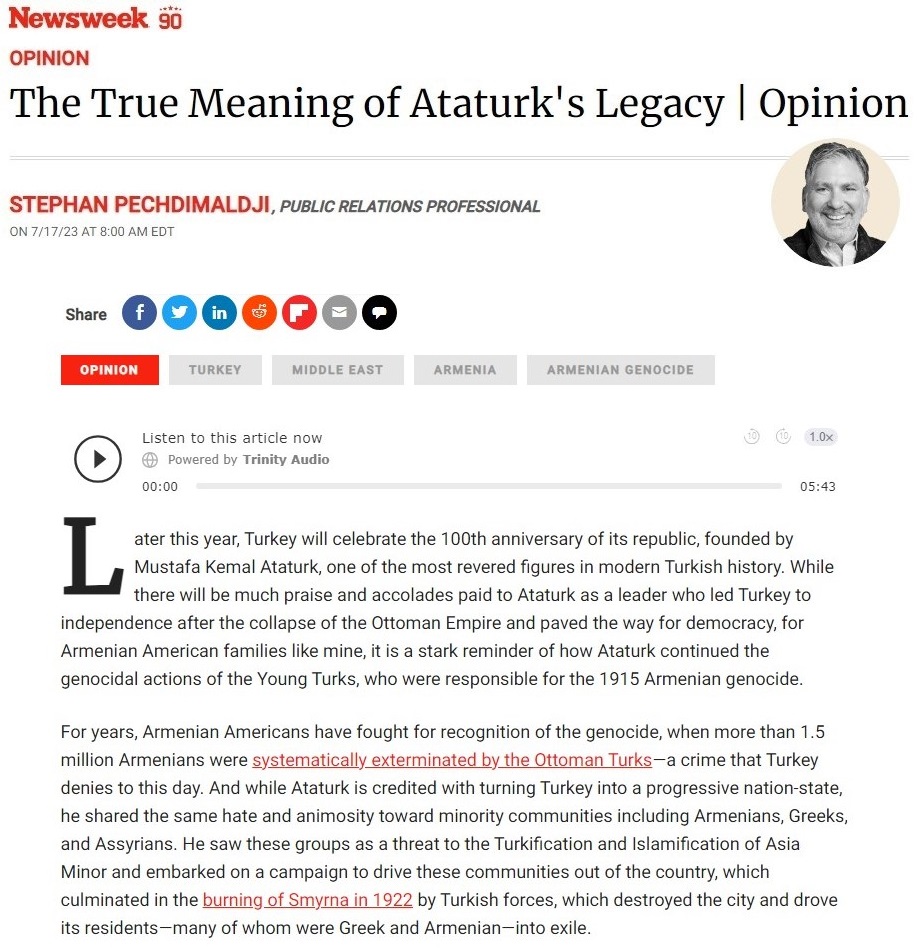
Jeremy SALT(*)
I am not Turkish and I am not a nationalist, but Stephan Pechdimaldji’s ranting diatribe against Mustafa Kemal ‘Atatürk’ in Newsweek (“The True Meaning of Ataturk’s Legacy”, July 17, 2023) is too much for anyone who knows something of the history and is not blinded by propaganda and hate. In Britain, Mr. Pechdimaldji’s rave would be dismissed as codswallop, in Australia a plainer word would be used, beginning with b.
To begin with, the total Armenian population of the Ottoman Empire in 1915 was about 1.5 million. As hundreds of thousands survived the war, or escaped while it was still being fought, Mr. PechdImaldji’s statement that “more than 1.5 million” who died is a fabrication, no matter how often Armenian propagandists and lobbyists repeat it.
Neither were the Armenians “systematically exterminated.” Such an accusation presumably comes from ‘documents’ long since shown to be forged, claiming that a committee of Young Turks met during the war and decided to wipe out all the Armenians. The reality is far messier. In many parts of what is now southeastern Turkey large numbers of Armenians certainly were slaughtered. Many more died from disease, exposure, or malnutrition, the same three elements that killed millions of Turks, Kurds, and other Muslim ethnic groups. Neither can the large-scale massacres of Muslims by Armenians be left out of the picture, although in mainstream ‘western’ histories they invariably are.
Many if not most of the Muslims killed in the east were Kurds. Revenge for Armenian massacres of Kurds and other Muslims was a clear motive for attacks on vulnerable Armenians as they were being moved south into Syria. If the convoys were not guarded by more soldiers or jandarma that was because all men of fighting age were off at the front. There were none to spare at a time of extreme pressure on the battlefield. Mustafa Kemal had nothing to with these terrible events or with the decision taken in 1915 to ‘relocate’ the Armenians.
Furthermore, in his warped reading of late Ottoman history, Mr. Pechdimaldji makes no mention of the two large-scale bouts of ethnic cleansing of Muslims in the Balkans (1877-78 and 1912-13), both warnings ahead of time of what Muslims could expect if Anatolia fell into enemy hands. Neither does the Greek invasion of western Anatolia in 1919 have any place in Mr. Pechdimaldji’s ‘history’ except as a further example of Turkish excesses. While there was cruelty on both sides, it was the Greek army that had invaded and subjected Turkish towns and villages to destruction, pillage, and murder. According to Arnold Toynbee, visiting the Aegean coast in 1921, the Greeks were waging a “war of extermination” against the Turks, to be followed by a scorched earth policy as they were driven back to the coast in 1922.
As for the Turks burning down Izmir, or “Smyrna” as Mr. Pechdimaldji calls it, the national/ethnic identity of the arsonists is disputed to this day, no matter how often ‘the Turks’ are blamed in the ‘western’ mainstream, whose biases Mr. Pechdimaldji simultaneously feeds off and fortifies. It would certainly be puzzling for the Turkish nationalists to destroy what they had just recaptured: as Greeks and Armenians were about to lose the city, as they saw it, it would be more credible that they should want to burn it down.
As Greeks and Armenians had welcomed the Greek army when it landed in 1919, fearing retribution, they of course fled the city when the Turkish national army arrived, but who ultimately was responsible for this tragedy if not the Greek government that had launched the invasion, its third attack on Ottoman lands since 1897, and the British government of David Lloyd George which had backed it?
As for Azerbaijan, Azerbaijanis and Armenians slaughtered each other in the 1918-1921 struggle for control of the Caucasus. Blaming Azerbaijan for the attack on Karabakh in 2020, Mr. Petchdimaldji sidesteps the 1988-94 war sparked by Armenian separatists and resulting in the displacement of up one million Azerbaijanis from their homes as well as half that number of Armenians. The outskirts of Baku became a shanty town for hundreds of thousands of refugees from Karabakh. The ‘enclave’ might be heavily populated with Armenians but it is still Azerbaijani territory, Karabakh on the map and only ‘Nagorno-Karabakh’ for the Armenians and a sympathetic ‘western’ media. Were the people of South Carolina to take up arms on the basis that they were not Americans but South Carolinians fighting for their independence, the federal government in Washington would no doubt take the same view as the government in Baku does of Armenian separatism.
Mr. Pechdimaldji’s reference to Atatürk’s hatred of Greeks, Armenians, and Assyrians because they stood in the way of Turkification and “Islamification” of Asia Minor is vituperative nonsense on two counts. First, there is no evidence that Atatürk hated these communities. This is a slander, but as the three groups had joined forces with the Ottoman Empire’s enemies during and after the war, he naturally regarded them with suspicion. Second, far from wanting to ‘Islamify’ Asia Minor – Anatolia – Atatürk set out to de-Islamify the new nation through the laws and regulations he issued in the 1920s.
Mr. Pechdimaldji’s jeering reference to how Turkey’s current president changed the country’s name to Türkiye to “part ways with bird comparisons” is childish, but even an intelligent child would be able to read history more honestly than he does.
Mr. Pechdsimaldji is the victim of his own hatreds and the propaganda that has fed them. What real history will tell him outside the propaganda tracts he clearly reads is that he has been duped, that there was no grand plan to exterminate the Armenians, that as much as they suffered horribly, Armenians were the perpetrators of large-scale violence as well as its victims. It is not just Turks who need to acknowledge what their forebears did in 1914-22 but Kurds, Greeks, Armenians, and Assyrians and other ethno-religious groups.
Noone comes out of this war with clean hands. It is the same in any war. If reconciliation is the objective, acknowledgement and empathy with other victims is the way ahead, not endless one-sided accusations that go nowhere positive.
Mr. Pechdimaldji is unaware that ethnic cleansing/genocide is a sword that can cut the person wielding it as readily as the person at whom it is aimed. Both expressions would accurately describe the purging of Muslims from the Balkans in 1877-78 and 1912-13 and the Greek onslaught on western Anatolia in 1919-1922.
As for the Armenians, there is abundant evidence in Ottoman and Russian archives that ahead of the state they hoped to establish in eastern Anatolia with Russian help, they sought to kill or drive out as many Muslims as they could. In a region more than 80 per cent Muslim, that was the only way an Armenian state could be established.
Turks do not agree with the accusation of genocide but they do acknowledge the large-scale killing of Armenians, which is more than Armenians have done up to the present day when it come to the killing of Muslims by their Ottoman forebears. This is the real history we need, not the distortions on which Mr. Pechdimaldji relies. If there is a final question to be asked it is why Newsweek would want to publish such a screed from someone who is not an historian but describes himself as a “public relations professional.”
(*) Independent researcher, formerly of University of Melbourne, Bosphorus University, and Bilkent University
© 2009-2025 Avrasya İncelemeleri Merkezi (AVİM) Tüm Hakları Saklıdır
Henüz Yorum Yapılmamış.
-
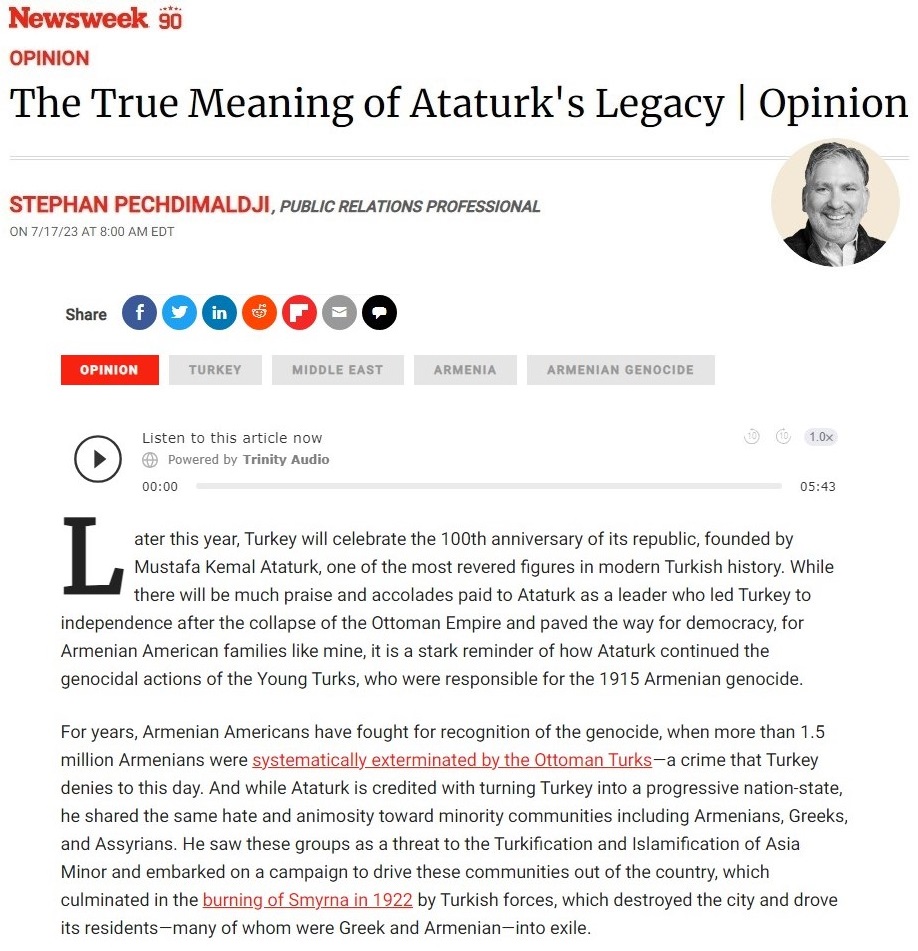 BİR HALKLA İLİŞKİLER UZMANININ MERCEĞİNDEN ‘TARİH’ - 27.07.2023
BİR HALKLA İLİŞKİLER UZMANININ MERCEĞİNDEN ‘TARİH’ - 27.07.2023
Jeremy SALT 28.07.2023 -
GALLIPOLI AND WHY TURKS ARE ANGRY
Jeremy SALT 22.11.2013 -
 ‘HISTORY’ THROUGH THE LENS OF A PR MAN - 23.07.2023
‘HISTORY’ THROUGH THE LENS OF A PR MAN - 23.07.2023
Jeremy SALT 24.07.2023 -
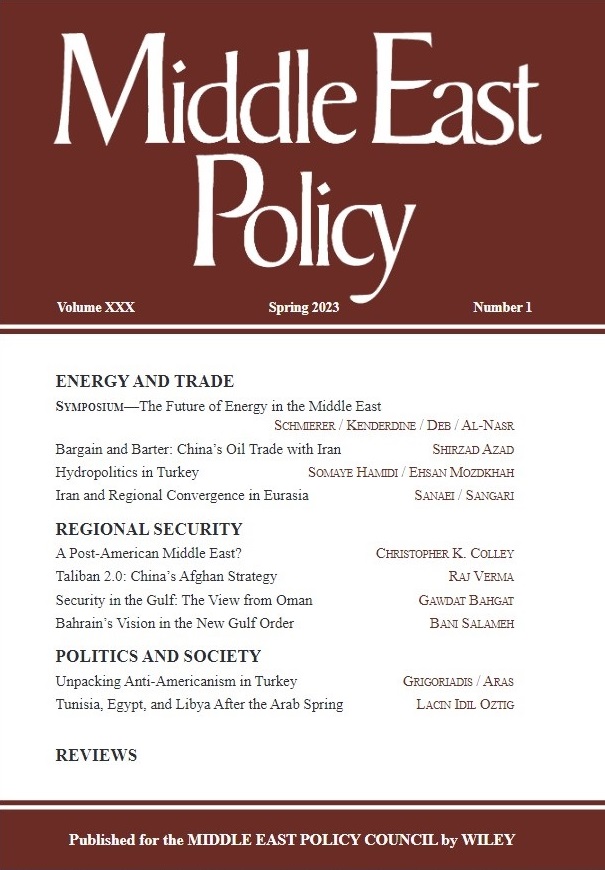 BOOK REVIEW: THE OTTOMANS: KHANS, CAESARS, AND CALIPHS - MIDDLE EAST POLICY - 01.03.2023
BOOK REVIEW: THE OTTOMANS: KHANS, CAESARS, AND CALIPHS - MIDDLE EAST POLICY - 01.03.2023
Jeremy SALT 12.04.2023 -
AİHM, ERMENİ DAVASINDA İFADE ÖZGÜRLÜĞÜNÜ TEYİT ETTİ
Jeremy SALT 27.10.2015
-
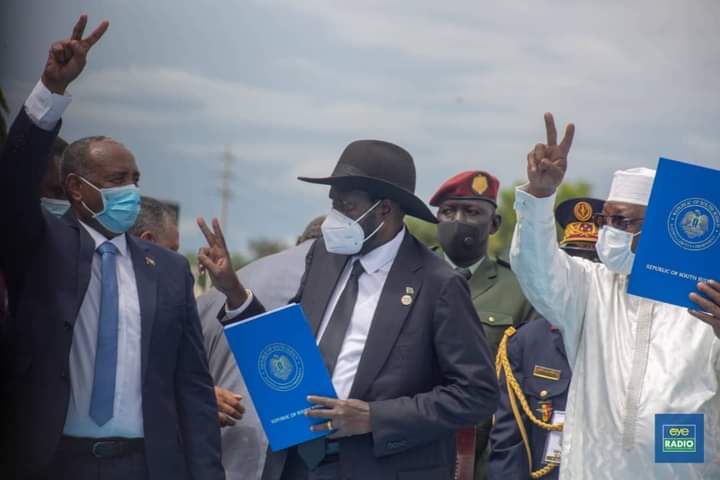 SUDAN-GÜNEY SUDAN BÖLÜNMESİNDE ROL OYNAYAN UNSURLAR - 12.10.2020
SUDAN-GÜNEY SUDAN BÖLÜNMESİNDE ROL OYNAYAN UNSURLAR - 12.10.2020
Hasan Sevilir AŞAN 12.10.2020 -
KKTC DAVA EDİLDİ
Ata ATUN 31.05.2012 -
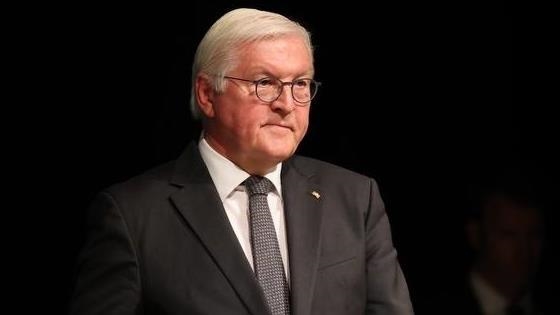 GERMAN PRESIDENT ASKS TANZANIA FOR FORGIVENESS FOR COLONIAL MASSACRES - 03.01.2024
GERMAN PRESIDENT ASKS TANZANIA FOR FORGIVENESS FOR COLONIAL MASSACRES - 03.01.2024
Hasan Servet ÖKTEM 03.01.2024 -
 ÜÇ DENİZ GİRİŞİMİ VE NATO GENİŞLEMESİ - 17.12.2021
ÜÇ DENİZ GİRİŞİMİ VE NATO GENİŞLEMESİ - 17.12.2021
Deniz ÜNVER 14.01.2022 -
İRAN’IN NÜKLEER TESİSİNDE PATLAMA (2/4)
Ata ATUN 31.01.2013


